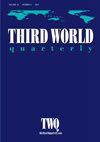Gender relations in Indigenous Yorùbá culture: questioning current feminist actions and advocacies
IF 1.8
2区 经济学
Q2 DEVELOPMENT STUDIES
引用次数: 0
Abstract
Abstract Gender hierarchy and inequality are attributes of Western colonialism enforced in several colonised societies. Similarly, feminism (Western), as the antithesis of European sexism, has permeated colonised societies and has been assimilated without proper reflection. This is concretely evident among the Yorùbá people of south-western Nigeria. Before European colonisation, Yorùbá culture was gender-neutral and gender-silent; women were seen as complementary and not subordinate to men. Hence, according to Oyěwùmí’s work on The Invention of Women, caution and reflections must be raised on the continual adoption of mainstream Western feminist philosophy in Yorùbá culture. In essence, the colonial imposition of the Western gender binary in Yorùbá society and women’s anti-colonial and feminist activities are discussed. Furthermore, the paper challenges some feminist approaches and ideologies in Nigeria, while advocating for a communal, transformative, and Pan-African feminism in Yorùbá and African societies. The decolonisation of Africa and the Yorùbá education system are recommended, alongside a proper history of Indigenous Yoruba people and knowledges. Contemporary feminist campaigns (including digital feminisms) and movements must also develop a ‘shared text of blackness’. The duo should align and improve the worth of women based on the indispensability and esteemed status offered to women in ‘pre-colonial’ Yorùbá society.原住民Yorùbá文化中的性别关系:对当下女权主义行动与倡导的质疑
摘要性别等级制度和不平等是西方殖民主义在几个殖民社会中实施的特征。同样,女权主义(西方)作为欧洲性别歧视的对立面,已经渗透到殖民社会,并在没有适当反思的情况下被同化。这一点在尼日利亚西南部的约鲁巴人中尤为明显。在欧洲殖民之前,约鲁巴文化是性别中立和性别沉默的;妇女被视为男性的补充而非从属。因此,根据OyŞwúmí关于《女性的发明》的著作,必须对约鲁巴文化中不断采用西方主流女权主义哲学提出警告和反思。从本质上讲,讨论了西方性别二元在约鲁巴社会的殖民强加,以及妇女的反殖民和女权主义活动。此外,该论文挑战了尼日利亚的一些女权主义方法和意识形态,同时在约鲁巴和非洲社会倡导社区、变革和泛非女权主义。建议非洲非殖民化和约鲁巴教育系统,以及约鲁巴土著人和知识的适当历史。当代女权主义运动(包括数字女权主义)和运动也必须发展一个“黑人的共享文本”。这对搭档应该在“前殖民地”约鲁巴社会中女性不可或缺和受人尊敬的地位的基础上,调整和提高女性的价值。
本文章由计算机程序翻译,如有差异,请以英文原文为准。
求助全文
约1分钟内获得全文
求助全文
来源期刊

Third World Quarterly
DEVELOPMENT STUDIES-
CiteScore
4.10
自引率
15.00%
发文量
137
期刊介绍:
Third World Quarterly ( TWQ ) is the leading journal of scholarship and policy in the field of international studies. For almost four decades it has set the agenda of the global debate on development discourses. As the most influential academic journal covering the emerging worlds, TWQ is at the forefront of analysis and commentary on fundamental issues of global concern. TWQ examines all the issues that affect the many Third Worlds and is not averse to publishing provocative and exploratory articles, especially if they have the merit of opening up emerging areas of research that have not been given sufficient attention. TWQ is a peer-reviewed journal that looks beyond strict "development studies", providing an alternative and over-arching reflective analysis of micro-economic and grassroot efforts of development practitioners and planners. It furnishes expert insight into crucial issues before they impinge upon global media attention. TWQ acts as an almanac linking the academic terrains of the various contemporary area studies - African, Asian, Latin American and Middle Eastern - in an interdisciplinary manner with the publication of informative, innovative and investigative articles. Contributions are rigorously assessed by regional experts.
 求助内容:
求助内容: 应助结果提醒方式:
应助结果提醒方式:


